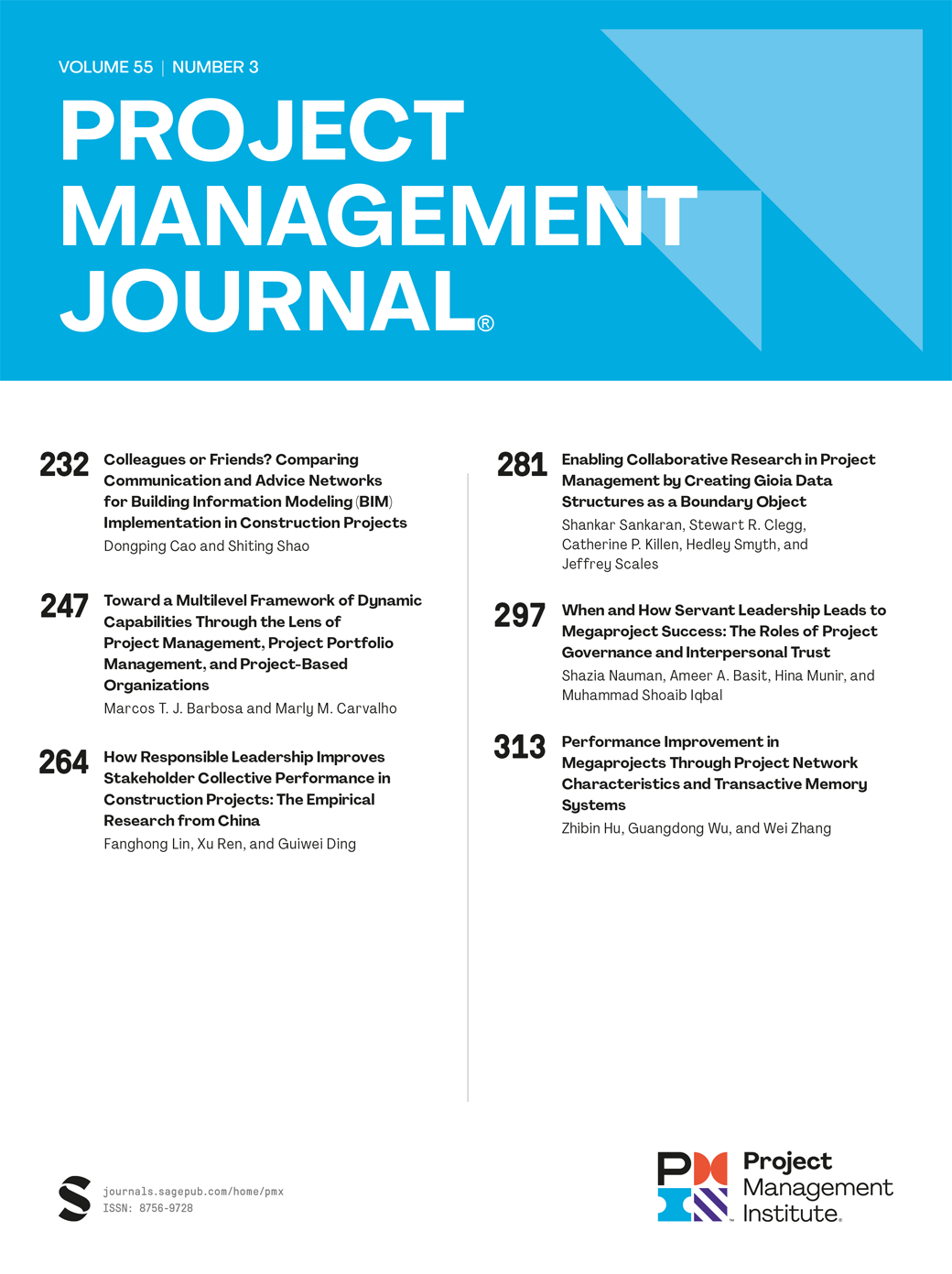The Entwinement of Project and Information Technology Research Editorial
IF 5.1
2区 管理学
Q1 MANAGEMENT
引用次数: 0
Abstract
I find it difficult to imagine any two management disciplines that are more interwoven than project management and information technology (IT) management. Were it not for project management, fewer technology implementations would have been completed with any degree of success. IT provides project managers with tools and principles to assist in attaining their success, has fundamentally altered practice, and should continue to do so (Steen et al., 2022; Whyte, 2019). Fundamental practices of each hold recognizable similarities, such as the early practices in information system development of structured programming with hierarchy charts and modularization paralleling the use of work packages in work breakdown structures to break larger concepts into manageable units. The waterfall approach to systems development followed from the concepts of planned projects, while agile development crossed from the IT world to be a major force in the management of projects. That’s not to say that the cross-fertilization was always recognized or capitalized upon. Revisiting my days as a consultant and director of a data processing shop (yes, it WAS called that) in the 1970s, I recall the frustrations associated with managing the design, development, and deployment of productive software. At that time, the most common advice was to estimate the time and cost of new software based on expectations of lines of code, then doubling or even quadrupling that estimate to have any realistic chance of meeting expectations. I think it was that frustration, as much as anything else, that led me back to earn my doctorate. Since those early days, I have dedicated most of my instruction and study to the improvement of the IT deployment process by considering and applying principles, practices, and theories of project management. My interest in projects as a critical body of knowledge to improve the process of digitizing organizations has opened many doors of opportunity, including faculty positions, conference organizing, and editorial roles. More importantly, it introduced me to scholars around the world who became coauthors, colleagues, and friends. Many of these individuals are represented in the pages of this special issue through their contributions to the advancement of IT management, project management, or both. In particular, I am grateful to Ralf Müller, friend and co-editor-in-chief of Project Management Journal, who suggested this special issue, and to my good friend and frequent coauthor James Jiang (JJ), who composed this issue. Just as JJ opened this issue with an excellent look forward into the world of digital strategies, I’m going to close with a reflection on our past work in the field of IT project management. A good deal of my colleagues’ and my work has roamed across many topics, theories, levels, and practices but I’ll focus on those related to major project research themes. One of the articles in this issue provides an excellent overview of the topics covered by influential researchers (Wu et al., 2023), but I’ll take a deeper dive.项目与信息技术研究的纠缠
我发现很难想象任何两个管理学科比项目管理和信息技术(it)管理更紧密地交织在一起。如果没有项目管理,很少有技术实现能够以任何程度的成功完成。IT为项目经理提供了工具和原则,以帮助他们获得成功,从根本上改变了实践,并应继续这样做(Steen等人,2022;怀特,2019)。每个基本实践都有可识别的相似之处,例如信息系统开发中使用层次图和模块化的结构化编程的早期实践,在工作分解结构中并行使用工作包,将较大的概念分解为可管理的单元。系统开发的瀑布方法遵循计划项目的概念,而敏捷开发则跨越了IT世界,成为项目管理中的主要力量。这并不是说杂交受精总是被认可或利用。回顾我在20世纪70年代作为数据处理商店(是的,它被称为数据处理商店)的顾问和主管的日子,我回忆起与管理生产软件的设计、开发和部署相关的挫折。在那个时候,最常见的建议是根据代码行数的期望来估计新软件的时间和成本,然后将估计翻倍甚至翻四倍,才有可能满足期望。我想,正是这种挫败感,以及其他种种因素,促使我重新获得了博士学位。从那时起,我就把大部分的教学和学习投入到通过考虑和应用项目管理的原则、实践和理论来改进IT部署过程中。我对项目的兴趣是作为一个关键的知识体来改善数字化组织的过程,这为我打开了许多机会之门,包括教师职位、会议组织和编辑角色。更重要的是,它把我介绍给了世界各地的学者,他们成为了我的合著者、同事和朋友。这些人中的许多人通过他们对IT管理、项目管理或两者的进步所做的贡献,在这期特刊的页面中得到了体现。我特别感谢《项目管理杂志》的朋友兼联合主编Ralf m ller,是他建议了这期特刊,也感谢我的好朋友兼经常合著者James Jiang (JJ)撰写了这期特刊。正如JJ以对数字战略世界的精彩展望开篇,我将以对我们过去在IT项目管理领域的工作的反思作为结束。我和我的同事们的大量工作涉及许多主题、理论、层次和实践,但我将重点关注与重大项目研究主题相关的内容。本期的一篇文章很好地概述了有影响力的研究人员所涵盖的主题(Wu et al., 2023),但我将进行更深入的研究。
本文章由计算机程序翻译,如有差异,请以英文原文为准。
求助全文
约1分钟内获得全文
求助全文
来源期刊

Project Management Journal
MANAGEMENT-
CiteScore
9.30
自引率
14.00%
发文量
40
期刊介绍:
Project Management Journal (PMJ) is the academic and research journal of the Project Management Institute and features state-of-the-art research, techniques, theories, and applications in project management.
Projects represent a growing population of human activity in large, small, private, and public organizations. Projects are used to execute and sustain today's organizational activities. They play a fundamental role as the engine of tomorrow's innovation, value creation, and strategic change. However, projects often fail to deliver their promise.
PMJ addresses these multiple challenges and opportunities by encouraging the development and application of novel theories, concepts, frameworks, research methods, and designs. PMJ embraces contributions both from within and beyond project management to augment and transform theory and practice.
 求助内容:
求助内容: 应助结果提醒方式:
应助结果提醒方式:


